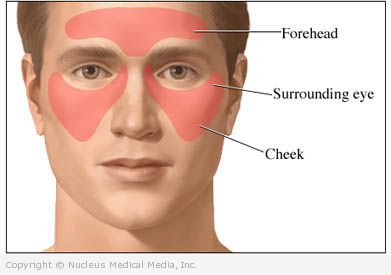Sinus headache – Definition
Sinus headache refers to head and facial pain associated with inflammation of the sinuses (called sinusitis). The sinuses are hollow cavities in the skull that have openings into the nose. Colds and allergies cause inflammation of the nasal passages and can lead to sinusitis. Sinus headache is a symptom of sinusitis.
Sinus headache – Causes
Allergies and viral upper respiratory infections increase nasal secretions and cause tissue lining the nasal passages to swell. This results in nasal congestion and stuffiness. The nasal passages become blocked and normal drainage cannot occur. Secretions that are trapped in the sinuses may become infected with bacteria or, rarely, fungus. The swollen tissue or infection may create pain and pressure.
Sinus headache – Risk Factors
A risk factor is something that increases your chance of getting a disease or condition. Risk factors for sinus headache include:
- Allergies
- Asthma
- Persistent cold or upper respiratory infection
- Ear infections
- Nasal polyps
- Tooth abscess or infection
- Enlarged tonsils or adenoids
- Nasal deformities, such as a deviated septum
- Cystic fibrosis
- Problems with immunity
- Prior sinus surgery
- Facial injuries that block sinus passages
- Traveling in an airplane if you have an upper respiratory infection
- Swimming in dirty water
Sinus headache – Symptoms
Symptoms of sinus headache may include:
- Pain and tenderness behind the forehead, cheeks, and around the eyes and ears
- Pain in the upper teeth
- Pain ranging from mild to severe
- Pain that is more intense first thing in the morning
- Pain that may worsen when you bend over
- Headache occurring with other symptoms of sinusitis, including:
- Nasal stuffiness and congestion
- Thick nasal drainage
- Postnasal drip
- Fever
- Fatigue
- Stuffy ears
- Sore throat
- Cough
- Puffiness around the eyes
Sinus headache – Diagnosis
The doctor will ask about your symptoms and medical history, and perform a physical exam. Your nasal secretions may be tested for allergies and infection.
If you suffer from chronic sinusitis, tests may include:
- CT scan — a type of x-ray that uses a computer to make pictures of structures inside the head
- Nasal endoscopy — using a thin, lighted tube to look inside your nose and possibly take samples of drainage to be tested
Sinus headache – Treatment
Sinus headache treatment aims to:
- Open the nasal passages
- Treat any infection
- Allow sinus cavities to drain
Treatment may include:
Medications
Medications may include:
- Pain relievers
- Decongestants to open clogged nasal passages, which allows the sinuses to drain—Do not use longer or more often than directed. Overuse of decongestant nose sprays may increase swelling and make your symptoms worse.
- Steroid nose spray to reduce inflammation
- Drugs that thin secretions
- Antibiotics — only if a bacterial infection has developed
Self-care During the Headache
Self-care includes:
- Breathe warm, moist air. Try inhaling steam.
- Try a mist of saline nasal spray to moisten the nasal passages and help remove crusty secretions. A saline spray can be used up to six times per day.
- Ask your doctor for directions on how to perform nasal irrigation that you can do at home.
- Do not smoke. If you smoke, quit.
- Avoid second-hand smoke and polluted air.
Surgery
Surgery is usually not required. Patients with a structural abnormality or chronic sinusitis that does not respond to medications may benefit from surgery. The doctor may perform one of several procedures to clean out your sinus cavities.
If you are diagnosed with a sinus headache, follow your doctor’s instructions.
Sinus headache – Prevention
The following strategies may reduce the risk of getting a sinus headache:
- Avoid exposure to anything that triggers allergy or sinus symptoms.
- Seek medical treatment for allergies.
- Wash your hands frequently to avoid colds.
- Seek treatment for a persistent cold before sinusitis sets in.
- Avoid alcoholic drinks. Alcohol can cause swelling of nasal and sinus tissues.
- Check with your doctor about using a decongestant before air travel.


